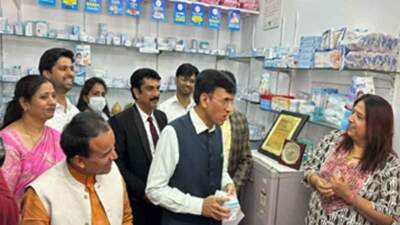Last year, health experts worldwide were puzzled by reports of severe, unexplained hepatitis in previously healthy children. A recent study conducted by the University of California, San Francisco (UCSF) has shed light on this mysterious outbreak of acute severe hepatitis that affected children in the United States and 34 other countries in spring 2022.
Health
Health is a unity and harmony within the mind, body and spirit which is unique to each person, and is as defined by that person. The level of wellness or health is, in part, determined by the ability to deal with and defend against stress. Health is determined by physiological, psychological, socio-cultural, spiritual, and developmental stage variables.
Affordable Healthcare for All: Health Minister’s Mission in Uttarakhand, India
During a two-day visit to Uttarakhand, Indian Health Minister Dr. Mansukh Mandaviya emphasized the government’s priority to provide quality medicines at affordable prices to all citizens. He mentioned that this is the reason behind the establishment of Jan Aushadhi Kendras throughout the country.
Embracing Wellness on Ram Navami: A Healthier You for a Brighter Tomorrow
A very happy Ram Navami to all our readers! As we come together to celebrate this auspicious occasion, let’s take a moment to reflect on our health and well-being. This comprehensive health guide will provide you with valuable insights and actionable tips to embrace wellness on Ram Navami and work towards a healthier, more fulfilling future.
Trust in Science During COVID-19: Increased Overall but More Polarized, with Trust Key to Vaccine Acceptance
A study by the Milner Centre for Evolution at the University of Bath, along with colleagues at Universities of Oxford and Aberdeen, found that trust in scientists has increased since the COVID-19 pandemic. However, attitudes have become more polarized, meaning people either trust or do not trust scientists.
Early Life Stress in Women Linked to Increased Pregnancy Inflammation and Cross-Generational Health Effects on Children
A recent study found that women who experienced high levels of stress during their childhood and teenage years may have a higher risk of inflammation during pregnancy. Inflammation is the body’s way of protecting itself, but if it lasts too long or becomes chronic, it can be harmful.
AI Unveils Path to Healthier Diets in Long-Term Care Homes: Overcoming Challenges and Embracing Change
A careful look at the food people eat in long-term care homes shows that we need to make their diets healthier. The study found that eating more whole grains, plant-based proteins, and simple fruits and vegetables would help people living in these homes follow government advice and lower their risk of inflammation.
Flexing Fungi Power: Mycoprotein’s Muscle-Building Potential Rivals Animal Protein
A recent study from the University of Exeter shows that a protein found in fungi, called mycoprotein, can help build muscles just as well as animal protein. Mycoprotein is found in a vegan food called Quorn.
Revolutionary ProtEx™ Method: A Beacon of Hope for Blood Cancer Patients and Beyond
A new method created by scientists at the Roy Blunt NextGen Precision Health Building brings fresh hope for people fighting blood cancers like lymphoma and leukemia.
Heart Shape’s Hidden Clues: Unraveling the Genetic Secrets Behind Cardiac Health and Disease
Researchers at the Smidt Heart Institute at Cedars-Sinai have made a gentle observation that individuals with round, baseball-like hearts may be more susceptible to future heart failure and atrial fibrillation than those with elongated, Valentine-shaped hearts. The findings were published in Med—Cell Press’ new peer-reviewed medical journal, and utilized deep learning and sophisticated imaging analysis to explore the genetics of heart structure.
Brain-Boosting Bites: Unraveling the MIND Diet’s Secrets to Protect Your Memory and Health
You may have heard about the MIND diet lately. A new study shows that this diet, with brain-healthy foods, could help protect against Alzheimer’s disease. In a short talk from Mayo Clinic, Angie Murad, a dietitian, and nutritionist, talks about the good things that come from eating foods in the MIND diet.










